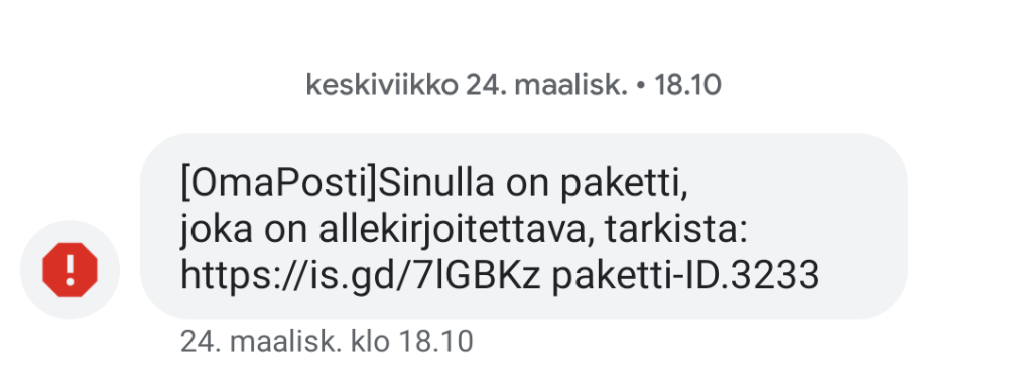Scam calls and text messages
1. Scam calls
Scam calls refer to situations where a caller claims to be, for example, an IT support representative or from Microsoft technical support. The purpose of scams is to get a person to disclose information or data. For example, a caller might claim that there is a security issue with your computer that he or she would like to fix. There may be other reasons. In some situations, a scammer wants to access your computer remotely and thereby steal your information from your computer. In the worst scams, the attacker has planned the contact to make it sound as credible as possible.
Scam calls should only be reported to the helpdesk if:
- If you have been the victim of a scam call, that is, you have given information to the scammer
- If the caller has spoken Finnish
- Or if the call has been a so-called. targeted. Meaning that the caller knew about you during the call, e.g. your full name, your supervisor’s name, and your job title (this means that the scam call was planned in advance).
- Note. Answering an unknown number does not in itself pose a risk of data theft, so all calls can be answered.
Remember:
- Do not share any of your information with an unknown person
- Under no circumstances should you allow any outside person to access your computer remotely
- If you have the slightest doubt about the identity of the caller, slow down the situation and think
2. Malwares spread by SMS getting more common
Online criminals are constantly looking for new ways to get their hands-on sensitive information. Currently malware, which is spreading via text messages is coming more common in Finland. The messages attempt to entice the person to click on a link in the message through which potential malware would be installed on the victim's phone. The subject of the messages can be a package-themed message from, for example, Posti or a currently becoming more common voicemail-themed message. You can click the pictures for more information.
IF YOUR DEVICE HAS BEEN INFECTED WITH FLUBOT
- Perform a factory reset on the device. If you restore your settings from a backup, make sure you restore from a backup created before the malware was installed.
- If you used a banking application or handled credit card information on the infected device, contact your bank.
- Report any financial losses to the police.
- Reset your passwords on any services you have used with the device. The malware may have stolen your password if you have logged in after you installed the malware.
- Contact your operator, because your subscription may have been used to send text messages subject to a charge. The currently active malware for Android devices spread by sending text messages from infected devices.
Be aware:
- Metropolia, Posti or any other official operator will never ask you to download any program to your phone via SMS.
- If malware is installed on your phone, it can steal data from your device and spread more scam messages.
If you have been victim of a scam, contact Metropolias HelpDesk immediately.
Phone service: 09 7424 6777
Email: https://hd.metropolia.fi / helpdesk@metropolia.fi
Huijauspuhelut- ja tekstiviestit (ohjeistus)
- Created by Unknown User (kimmosv), last modified on 13.6.2022
